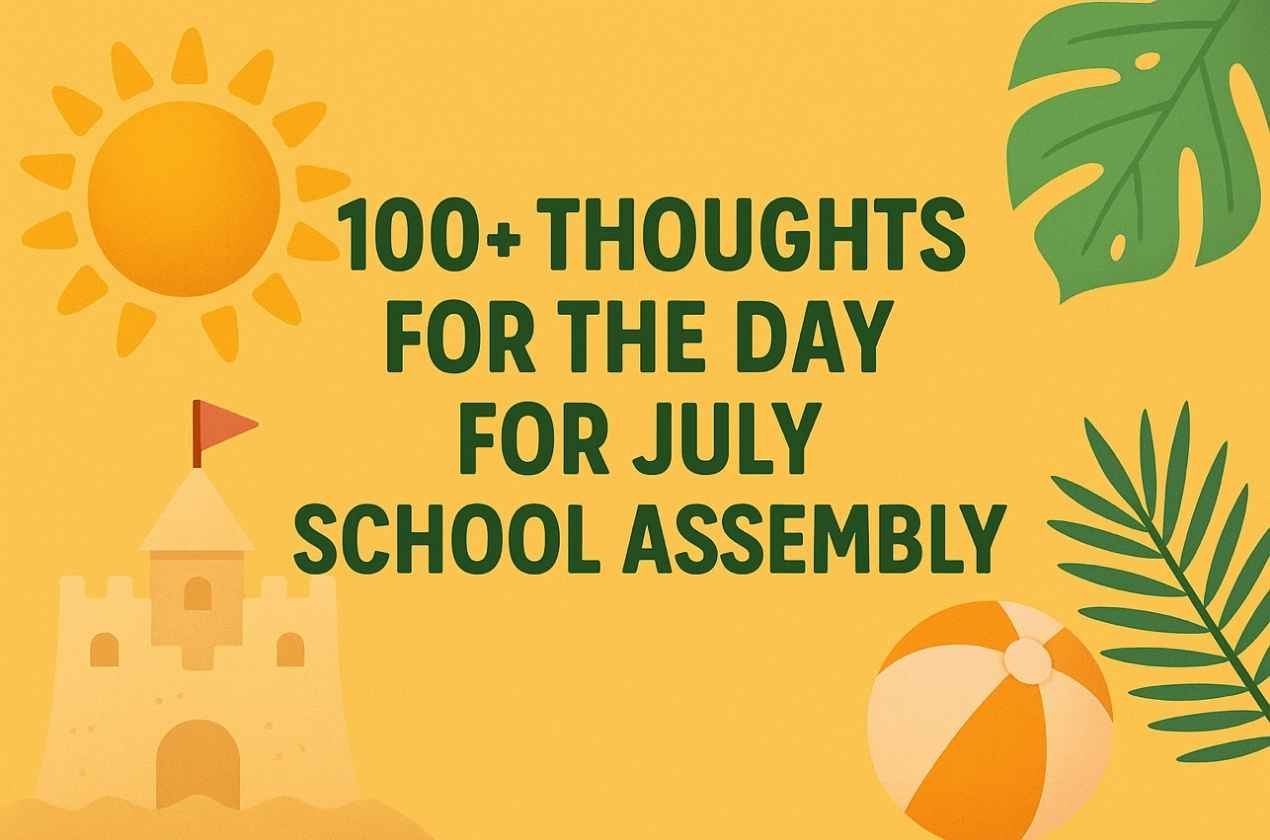100+ Questions of the Day for Students: Questions and Answers for School Assembly
Hello readers, welcome to another post filled with knowledge. As you know, we are the best provider of daily school morning assembly material. We work hard to update everything related to morning assemblies.
We previously had a series on the “Word of the Day.” Today, we’ve collected some of the best “Questions of the Day for Students” that can be used in daily morning assemblies. These questions, along with their answers, are very interesting.
These “Questions of the Day,” covering general knowledge, science, social studies, and space-related topics, make morning assemblies engaging and informative. So, let’s take a look at these Questions of the Day with Answers.
What is the Benefit of “Question of the Day with Answer” for Morning Assembly?
Benefits and Purpose of “Question of the Day with Answers” for Morning Assembly
t encourages students to think about various topics and ask questions, sparking a natural desire to explore new ideas.
•Encourages Learning: By introducing new concepts in a simple and engaging way, it provides a daily opportunity for students to expand their knowledge.
•Engages Students: This practice makes the assembly more interactive and enjoyable. Students participate and look forward to the daily question and answer.
•Expands Knowledge: The questions cover a wide range of subjects, helping students build a well-rounded understanding of the world.
•Enhances Memory: Repeating questions and answers helps reinforce information, aiding in better retention of facts and concepts.
•Builds Confidence: It encourages students to speak up and share their thoughts, boosting their confidence and helping them practice public speaking.
•Sets a Positive Tone: Starting the day with a thoughtful question sets a positive tone, uplifting the mood and energizing students for the day.
•Encourages Discussion: The questions prompt students to discuss and debate, fostering a healthy exchange of ideas and developing their critical thinking skills
You can use these thought-provoking and engaging questions in school assembly.
Question of the Day: Top 100 GK Questions for School Assembly
Question of the Day for Primary Classes (Nursery, LKG, and UKG)
- What color is the sky during a sunny day?
Answer: Blue - How many legs does a cat have?
Answer: Four - What sound does a cow make?
Answer: Moo - What shape is a ball?
Answer: Round - What is the name of the planet we live on?
Answer: Earth - What fruit is red and often used to make juice?
Answer: Apple - How many wheels does a bicycle have?
Answer: Two - What animal is known as man’s best friend?
Answer: Dog - What do we use to write on paper?
Answer: Pencil - What is the name of our country?
Answer: India - What do you see in the sky at night that shines bright?
Answer: Stars - What is the opposite of hot?
Answer: Cold - What do you call a house for birds?
Answer: Nest - What grows in a garden and has colorful petals?
Answer: Flowers - What do bees make that we can eat?
Answer: Honey - What do you wear on your feet when you go outside?
Answer: Shoes - What animal has a long trunk and big ears?
Answer: Elephant - What is the shape of a pizza?
Answer: Circle - What do you use to wash your hands?
Answer: Soap - What season comes after winter?
Answer: Spring
Special Question of the Day for Class 1, 2, and 3rd Kids
Suggest us some best GK (general knowledge)questions with answers for morning assembly in comment box.
- What is the largest planet in our solar system?
Answer: Jupiter - How many days are there in a week?
Answer: Seven - What is the capital of India?
Answer: New Delhi - What do plants need to grow?
Answer: Water, sunlight, and soil - What is the tallest animal in the world?
Answer: Giraffe - What are the primary colors?
Answer: Red, blue, yellow - What do you call the person who flies an airplane?
Answer: Pilot - How many continents are there in the world?
Answer: Seven - What is the name of the gas we breathe in?
Answer: Oxygen - Who wrote the national anthem of India?
Answer: Rabindranath Tagore - What do you call a young dog?
Answer: Puppy - What planet is known as the Red Planet?
Answer: Mars - What part of the plant is used to make food?
Answer: Leaves - What is the smallest unit of matter?
Answer: Atom - Who is known as the Father of the Nation in India?
Answer: Mahatma Gandhi - What do we use to tell the time?
Answer: Clock - How many seasons are there in a year?
Answer: Four - What is the largest animal in the ocean?
Answer: Blue whale - What do we call the star at the center of our solar system?
Answer: The Sun - What is the main ingredient in bread?
Answer: Flour
Question of the Day for Class 4, 5, and 6th Students
You can share these GK questions of the day with students the day before the special GK-based assembly.
- What is the process by which plants make their food?
Answer: Photosynthesis - Who was the first President of India?
Answer: Dr. Rajendra Prasad - What is the boiling point of water?
Answer: 100°C - What are the three states of matter?
Answer: Solid, liquid, gas - Who invented the telephone?
Answer: Alexander Graham Bell - What is the largest desert in the world?
Answer: Sahara Desert - What is the hardest natural substance on Earth?
Answer: Diamond - How many bones are there in the human body?
Answer: 206 - What do you call the study of the weather?
Answer: Meteorology - Who discovered penicillin?
Answer: Alexander Fleming - What is the longest river in the world?
Answer: Nile River - What is the smallest continent by land area?
Answer: Australia - What is the chemical symbol for water?
Answer: H2O - Who was the first man to walk on the moon?
Answer: Neil Armstrong - What is the currency of Japan?
Answer: Yen - Who wrote the Harry Potter series?
Answer: J.K. Rowling - What is the main gas found in the air we breathe?
Answer: Nitrogen - What do you call an animal that eats only plants?
Answer: Herbivore - What is the name of the largest ocean on Earth?
Answer: Pacific Ocean - What is the capital city of France?
Answer: Paris
Question of the Day for Class 7, 8, and 9th Students
we choose some hard questions with answers for your best morning assembly meetings.
- What is the powerhouse of the cell?
Answer: Mitochondria - What is the longest bone in the human body?
Answer: Femur - Who is known as the Iron Man of India?
Answer: Sardar Vallabhbhai Patel - What is the chemical formula for salt?
Answer: NaCl - What is the name of the first satellite launched into space?
Answer: Sputnik - What is the primary source of energy for the Earth’s climate system?
Answer: The Sun - Who wrote the play “Romeo and Juliet”?
Answer: William Shakespeare - What is the capital of Australia?
Answer: Canberra - What is the pH value of pure water?
Answer: 7 - Who developed the theory of relativity?
Answer: Albert Einstein - What is the main function of the roots of a plant?
Answer: To absorb water and nutrients - What organ is responsible for pumping blood throughout the body?
Answer: The heart - What is the process of converting a gas into a liquid called?
Answer: Condensation - Who is known as the father of the computer?
Answer: Charles Babbage - What is the highest mountain in the world?
Answer: Mount Everest - What is the chemical name for baking soda?
Answer: Sodium bicarbonate - What do you call the study of rocks?
Answer: Geology - Who was the first Indian woman to win a Nobel Prize?
Answer: Mother Teresa - What is the SI unit of force?
Answer: Newton - What is the process by which a caterpillar becomes a butterfly?
Answer: Metamorphosis
Question of the Day for Class 10, 11, and 12th Students
Use these questions and answers as a GK quiz in the daily school morning assembly.
- What is the atomic number of carbon?
Answer: 6 - Who wrote “To Kill a Mockingbird”?
Answer: Harper Lee - What is the speed of light in a vacuum?
Answer: Approximately 299,792 kilometers per second - What is the capital of Canada?
Answer: Ottawa - What is the chemical formula for glucose?
Answer: C6H12O6 - Who proposed the law of universal gravitation?
Answer: Sir Isaac Newton - What is the most abundant gas in the Earth’s atmosphere?
Answer: Nitrogen - What are the three branches of the Indian government?
Answer: Executive, Legislative, Judiciary - What is the unit of electric current?
Answer: Ampere - Who is known as the Missile Man of India?
Answer: Dr. A.P.J. Abdul Kalam - What is the name of the boundary between the Earth’s crust and mantle?
Answer: The Mohorovičić discontinuity - What is the function of hemoglobin in the blood?
Answer: To carry oxygen - Who was the first woman Prime Minister of India?
Answer: Indira Gandhi - What is the theory that explains the origin of the universe?
Answer: The Big Bang Theory - What is the main ingredient in cement?
Answer: Limestone - What is the capital of Russia?
Answer: Moscow - What is the chemical symbol for gold?
Answer: Au - Who is the author of “Pride and Prejudice”?
Answer: Jane Austen - What is the highest civilian award in India?
Answer: Bharat Ratna - What is the principle of the conservation of energy?
Answer: Energy cannot be created or destroyed, only transformed
Question of the Day for College Students
- What is the principle of superposition in quantum mechanics?
Answer: A system exists simultaneously in multiple states until measured - Who discovered the double helix structure of DNA?
Answer: James Watson and Francis Crick - What is the significance of the Treaty of Versailles?
Answer: It ended World War I and imposed harsh terms on Germany - What is the economic theory of supply and demand?
Answer: Prices are determined by the relationship between supply and demand - What is the difference between microeconomics and macroeconomics?
Answer: Microeconomics studies individual markets; macroeconomics studies the economy as a whole - What is the Schrödinger equation?
Answer: It describes how the quantum state of a physical system changes over time - What is the significance of the Renaissance period in history?
Answer: It was a cultural movement that marked the rebirth of art and learning in Europe - What are Newton’s three laws of motion?
Answer: They describe the relationship between the motion of an object and the forces acting on it - What is the human genome project?
Answer: An international research effort to sequence and map all human genes - What is the principle of relativity?
Answer: The laws of physics are the same in all inertial frames of reference - What is the significance of the periodic table in chemistry?
Answer: It organizes elements based on their atomic number and properties - What is the concept of a black hole in astrophysics?
Answer: A region of space where gravity is so strong that nothing can escape - What is the difference between a republic and a democracy?
Answer: A republic has elected representatives; a democracy involves direct participation of citizens - What is the role of mitochondria in cells?
Answer: They produce energy through cellular respiration - What is the significance of the Magna Carta?
Answer: It limited the powers of the king and established the principle of the rule of law - What is the law of diminishing returns?
Answer: In production, as one input increases, the marginal output decreases - What is the Heisenberg uncertainty principle?
Answer: It states that the position and momentum of a particle cannot be simultaneously measured with precision - What is the difference between renewable and non-renewable energy sources?
Answer: Renewable sources are replenished naturally; non-renewable sources are finite - What is the significance of the United Nations?
Answer: It promotes international cooperation and peace - What is the concept of globalization?
Answer: The process of increasing interconnectedness and interdependence among countries.
5 Most Important FAQs with Answers
1. What is the “Question of the Day”?
A daily question presented during school assemblies to engage students.
2. Who can participate in answering the questions?
All students, from Nursery to College, are encouraged to participate.
3. What subjects are covered in the questions?
Topics include general knowledge, science, history, and current events.
4. How does it benefit students?
It promotes curiosity, builds confidence, and expands their knowledge base.
5. How often are the questions updated?
The questions are updated daily for each morning assembly.
We hope you enjoy these Questions of the Day. This segment is a key part of morning school assemblies, giving students a chance to engage their minds and expand their general knowledge.
Including a Question of the Day makes assemblies more fun and educational. Let’s make each morning assembly a time for excitement and learning!
Dear Readers, if you find any mistakes, please inform us in the comment box. After checking, we will rectify them. Comment your favorite ‘Word of the Day’ that motivates you daily. Have a wonderful day.
Your Daily Source for Anchoring Scripts, Speech Topics, and Inspirational Thoughts to Elevate Your Morning Assembly Experience. Stay with us.







1 thought on “100+ Question of the Day for School Assembly for Students”